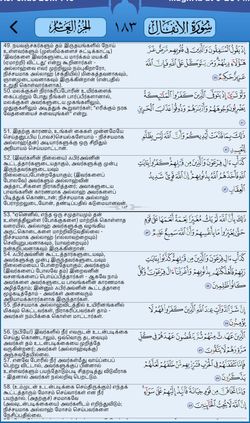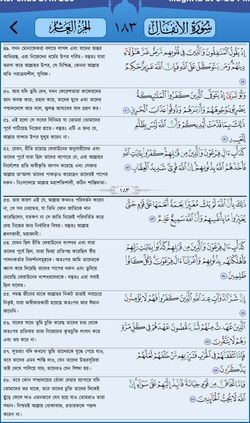Feb 14, 2025
Surah Al Anfal (Verses 49-58)
بِسْمِ ٱللَّٰهِ ٱلرَّحْمَٰنِ ٱلرَّحِيمِ,
(bi-smi llāhi r-raḥmāni r-raḥīm)
"In the name of Allah, the Most Gracious, the Most Merciful"
"Assalamualaikum/Hello and welcome! It's a pleasure to have you join us on this platform. Feel free to explore and engage with our community."
Feel free to join the cafe and our Instagram page for notifications and updates;
Hilokal;
https://hilokal.page.link/eUxfM
Instagram;
https://instagram.com/ideologyovlife?igshid=NjIwNzIyMDk2Mg==
Chapter 8, Verses 49-58
Surah Al-Anfal, Verses 49-58
Recitation.
Translation.
Tafseer.
LESSON # 7 Chapter # 8 (Surah Al Anfal)
For English Reference;
https://www.islamicstudies.info/tafheem.php?sura=8&verse=49&to=58
For Urdu Reference;
https://tafheem.net/islamikitabein/urduref.php?sura=8&verse=49-58
Translations;
Please follow the sequence to find your language;
English
Urdu
Hindi
Tamil
Bangali
Korean
Kurdish
Turkish
Portuguese
Spanish
LESSON # 7 of Chapter # 8.
Difficult Vocabularies from LESSON # 7 (Chapter # 8 Verses 49-58)
Verse # 49.
1- Fanaticism. (Noun)
(Extreme beliefs that may lead to unreasonable or violent behaviour.)
2- Zealotry. (Noun)
(Fanatical and uncompromising pursuit of religious, political, or other ideals; fanaticism.)
3- Rout. (Verb)
(To defeat an enemy completely and force them to run away.)
Verse # 51.
4- Wrought. (Adjective)
(Made or done in a careful or decorative way.)
Verse # 52.
5- Stern. (Adjective)
(Severe, or showing disapproval.)
6- Retribution. (Noun)
(Deserved and severe punishment.)
Verse # 53.
7- Render. (Verb)
(To cause someone or something to be in a particular state.)
8- Deprived. (Adjective)
(Not having the things that are necessary for a pleasant life, such as enough money, food, or good living conditions.)
Verse # 56.
9- Affinity. (Noun)
(A liking or sympathy for someone or something, especially because of shared characteristics.)
10- Irked. (Verb) Past Participle
(To annoy someone.)
11- Scathing. (Adjective)
(Criticizing someone or something in a severe and unkind way)
12- Sabotage. (Verb)
(To damage or destroy equipment, weapons, or buildings in order to prevent the success of an enemy or competitor.)
13- Rejuvenate. (Verb)
(To make someone look or feel young and energetic again.)
14- Animosities. (Plural Noun)
(Strong dislike, opposition, or anger.)
15- Fratricide. (Noun)
(The crime of murdering your brother, or killing members of your own group or country.)
16- Nefarious. (Adjective)
((Especially of activities) morally bad.)
17- Spiteful. (Adjective)
(Wanting to annoy, upset, or hurt another person, especially in a small way, because you feel angry towards them.)
18- Vigorously. (Adverb)
(In a way that is very forceful or energetic.)
19- Stirring Elegies. (Phrasel Verb)
(May refer to poems or performances that honor those who have passed away or to a Broadway Cares/Equity Fights AIDS event.)
Verse # 58.
20- Treachery. (Noun)
(Behaviour that deceives or is not loyal to someone who trusts you.)
21- Treacherous. (Adjective)
(If the ground or sea is treacherous, it is extremely dangerous, especially because of bad weather conditions.)
22- Unilaterally. (Adverb)
(In a way that involves doing or deciding something without first asking or agreeing with another person, group, or country.)
23- Flings. (Verb)
(To throw something or someone suddenly and with a lot of force.)
24- Elucidated. (Verb) Past Participle
(To explain something or make something clear.)
25- Embellish. (Verb)
(To make something more beautiful by adding something to it.)
26- Manoeuvre. (Noun)
(A movement or set of movements needing skill and care.)
27- Vogue. (Noun)
(A fashion or general liking, especially one that is temporary.)
28- Pleading. (Adjective)
(Dhowing in an emotional way that you want something urgently)
29- Forgery. (Noun)
(An illegal copy of a document, painting, etc. or the crime of making such illegal copies.)
30- Proffer. (Verb)
(To offer something by holding it out, or to offer advice or an opinion.)
31- Pretext. (Noun)
(A pretended reason for doing something that is used to hide the real reason.)
32- Ambiguous. (Adjective)
(Having or expressing more than one possible meaning, sometimes intentionally.)
33- Pretence. (Noun)
(A way of behaving that is intended to deceive people.)
34- Bbelligerent. (Adjective)
(Wishing to fight or argue.)
35- Sstealth. (Noun)
(Movement that is quiet and careful in order not to be seen or heard.)











LESSON # 7 of Chapter # 8.
References from LESSON # 7 (Chapter # 8 Verses 49-58)
Verse # 56.
1- (Ibn Hisham, vol. 2. p. 51 - Ed.)
2- (lbn Hisham, vol. 2, p. 47 - Ed.)
Verse # 58.
3- (Abu Da'ud, 'Jihad', Babfi al-Iman yakunbaynaha al-'Aduw 'Ahad, vol. 2, p. 75; Ahmad b. Hanbal, Musnad, vol. 4, pp. 111 and 113 - Ed.)
4- (Abu Da'ud, Kitab al-Buyu', 'Bab fi al-Rajul Ya'khudh Hakkahu man tahe Yadih', vol. 2, p. 260 - Ed.)
5- (See the comments on the verse by Qurtubi and Ibn Kathir. See also Ahmad b. Hanbal, Musnad , vol. 4, pp. 113 and 389 - Ed,)
6- (See Qurtubi's comments on the verse - Ed.)
7- (Al-Tabari. Ta'rikh, vol. 3, p. 46 -Ed.)
8- (Ibn Hisham. vol. 2, p. 395 - Ed.)
LESSON # 7 of Chapter # 8.
Summary of Verses (49-58) of Chapter # 8 Surah Al Anfal:
Here are the concise summary points based on the verses of Surah Al-Anfal:
1. Hypocrites' Doubt:
The hypocrites and those whose hearts were diseased believed that the Muslims' faith was misguided, thinking they would be defeated by the Quraysh. However, trust in Allah ensures His might and wisdom.
2. Divine Retribution for Disbelievers:
The angels punish the disbelievers by striking them, and they are told to "taste the torment of burning," as a consequence of their deeds.
3. Comparison with Past Nations:
The disbelievers' fate mirrors the punishment faced by Pharaoh's people and those before them, who were destroyed for rejecting Allah's signs.
4. Change in God's Favor:
Allah does not change His favor on a people unless they change their own attitude. Nations are only deprived of divine favor if they become unworthy.
5. Worst Creatures in Allah's Sight:
Those who reject the truth and break their covenants with Allah, especially the Jews who violated their agreement with the Prophet, are condemned.
6. Hostile Activities of the Jews:
Some Jewish tribes, like Banu Qaynuqa', broke their treaty by insulting Muslims, and others actively collaborated with the Quraysh against the Muslims.
7. Lawful to Fight Violators:
If a treaty is violated by an ally, Muslims are permitted to disregard it and even engage in hostilities against those who break their agreements.
8. Announcing Treaty Termination:
Muslims should inform the other party if they annul a treaty, rather than act unilaterally. This maintains transparency and prevents betrayal.
9. Islamic International Law:
Unilateral breach of a treaty is forbidden unless the ally has clearly violated it. In such a case, Muslims can take military action without prior warning, as exemplified by the Prophet (peace be on him) during the Quraysh breach of the Hudaybiyah treaty.
10. Principles of Just War:
Islam allows military action after publicly announcing the annulment of a treaty. Any covert attack is considered immoral.
Thank you everyone for joining.
May Allah rewards all of you for your precious time spent here & may Allah keeps pouring his blessings upon you and your loved ones.
Stay safe & and blessed.
Aslamualaikum to all of you.
J A Z A K A L L A H U K H A I R E V E R Y O N E .
By undefined
18 notes ・ 2 views
English
Proficient